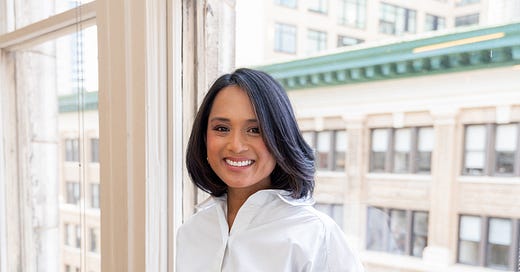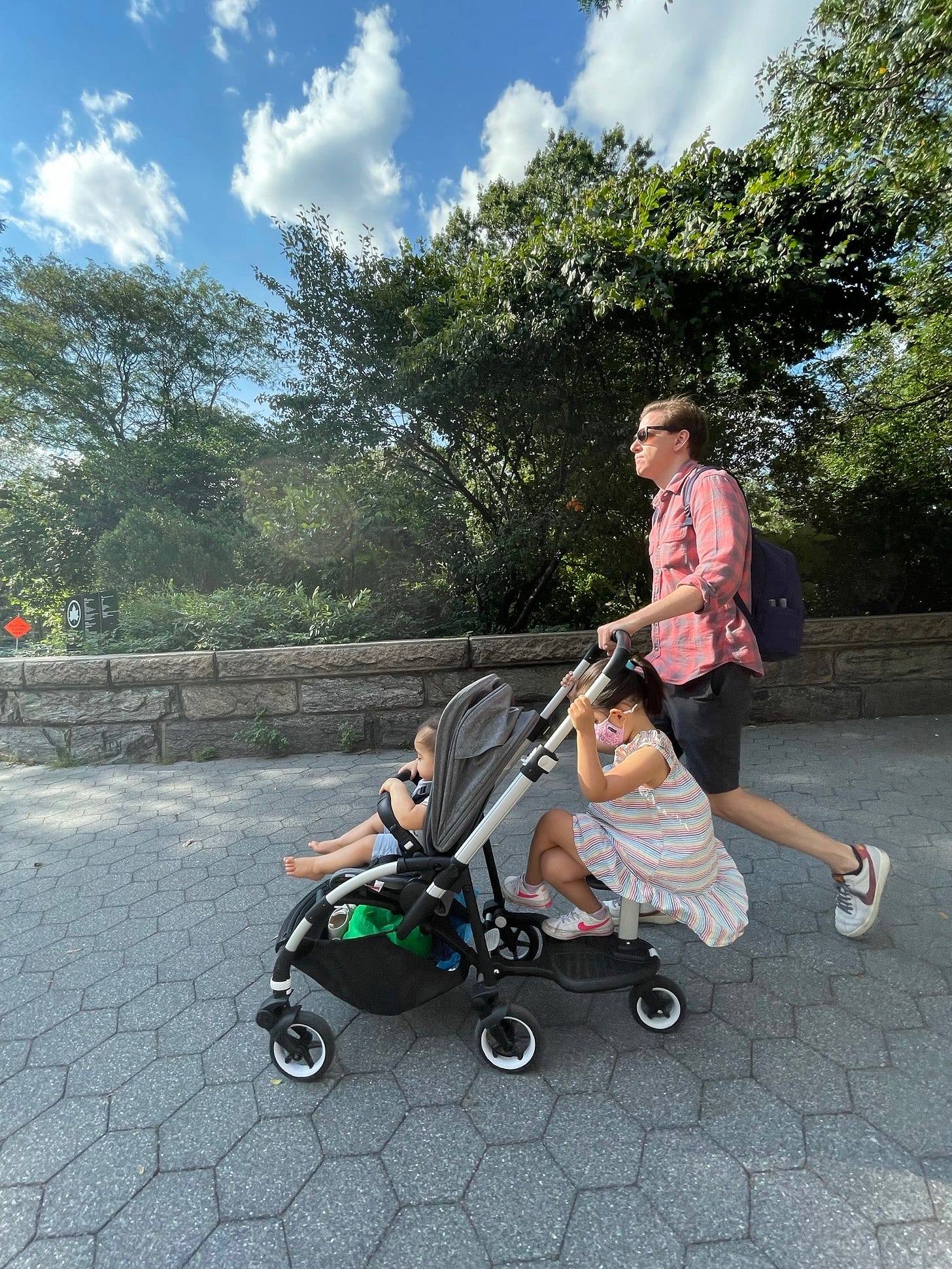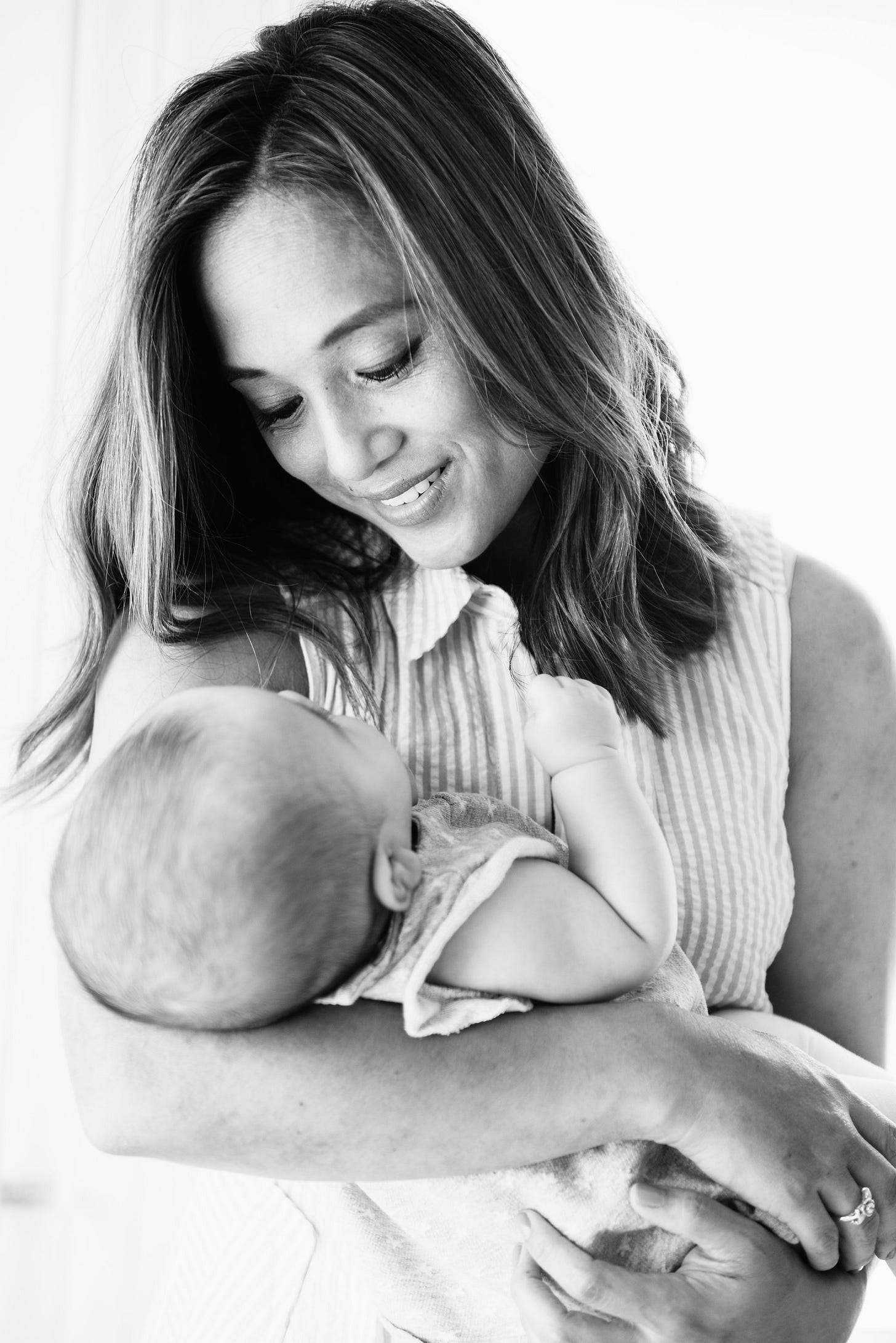Motherhood Identity Series with Jeanelle Teves, chief commercial officer at Bugaboo North America
An inspiring leader chats about building the fastest growing stroller brand in North America, raising bilingual kids, and rewriting what it means to “have it all.”
Jeanelle Teves was leading Nike Women’s business in New York City by 31. Then she had her first baby—and everything changed.
Not in the way ambition-fearing headlines might suggest. Her drive didn’t disappear. Her goals didn’t shrink. But motherhood redefined what success looked like: less about checking boxes, more about creating impact. Less about being everywhere at once, more about showing up fully—where it matters most.
Today, Jeanelle is the Chief Commercial Officer at Bugaboo North America and mom to two young kids. She’s helping shape the very products that support parents through their earliest, most transformative chapters. Under her leadership, Bugaboo has become one of the fastest-growing stroller brands in North America—known for combining elevated design with unmatched durability, and for creating gear that actually fits the way modern families move. From engineering strollers that can carry nearly 30 pounds of groceries to setting an ambitious Net Zero goal by 2035, Bugaboo is building smarter solutions and a more sustainable future for the next generation.
And Jeanelle is helping lead that charge—not just as an executive, but as a mom who’s lived the realities these products are built for. In this week’s Motherhood Identity Series, she reflects on postpartum shifts, reimagining work-life balance, and how motherhood made her a more intentional, empathetic leader. Because the goal was never to bounce back—it was to build something better.
Let’s start with identity—how has becoming a mother changed or deepened your sense of self, both personally and professionally?
The first months of new motherhood for me were so disorienting, I was physically healing, not sleeping, and consumed with worry. In hindsight, all of these things are typical, and I wish that I were a bit more gentle with myself. That’s my first piece of advice to new moms. But out of that fog came my priorities, crystal clear. Now, how I spend my energy is oriented to how I can be the best version of myself, which in turn has a direct impact on the kind of mother I am to my two kids.
Personally, this means really practically making sure that I am eating well, sleeping enough, moving my body, and making time for my girlfriends. If I do a little bit of all of these things, it makes my life full and rich, and therefore I feel like I am a happy person, and a present parent.
In the workplace, becoming a mother made me more intentional. I lead with more focus because my hours are finite, and being home for family dinner is a priority for me. I also have a stronger sense of why I do what I do — doing work that has impact. I get to come to work every day to help new parents on their way to the most meaningful chapter of their lives.
You’ve led major brands across continents, from Nike to Bugaboo. How did your transition into motherhood impact your leadership style or perspective in the workplace?
Motherhood shifted my pace and perspective. From a career progression standpoint, the narrative that being a parent negatively impacts your career is a falsehood. I became more decisive, less reactive, and significantly more focused on building teams and systems around me, so I could perform at my best in all areas of my life. As a result, I think that’s made me more successful.
As a people manager, I have the privilege to interact with and guide a large team. They are witness to me at my best, but also times when I could have been better. But even in the moments of disappointment or frustration, I always take a beat to think about how a comment or harsh feedback will land with someone. Would I want a boss speaking to my children in their future jobs this way? There is a way to deliver firm and critical feedback, but still with empathy. I think motherhood has softened me in that way.
At Bugaboo, you’ve championed modern parental leave and employee wellness policies. What inspired you to prioritize this, and how do you hope it changes the standard for corporate America?
My first day at Bugaboo was my first day back from maternity leave. My priorities 1 and 2 were assessing the business, then getting to know the team, which included reviewing our employee policies and how we cared for them. I had my own 5-month-old at home, with a toddler to care for, and was settling into my new role.
My own experiences fully informed the change I wanted to create in the business I was running—one where parents would feel supported and successful at work, and wouldn’t have to compromise one to fulfill the other. We have also partnered and supported Paid Leave for All for the past two years, and are grateful to help propel that mission forward as well.
What does a “successful” day look like to you now, compared to before becoming a mom?
Before, success was output. How many things could I check off my list? Now, its impact. I identify the three biggest tasks that need my attention, input, or approval, and those are what I prioritize. I write them down every morning in my journal, and that’s what I focus my energy on.
Some days it's “Order the balloons for the birthday party,” and other days it's “Nail my presentation for the board meeting.” As a working mother, you wear different hats, so there will always be conflicting priorities. It is deciding on which priorities get your attention that day, which is a constant exercise for me.
You’ve been open about creating parenting solutions that meet the needs of modern families. How does your experience as a working mom shape the way you approach product development and brand collaborations?
Being the Chief Commercial Officer of Bugaboo North America, while having stroller-aged children myself, has made me laser-focused on solving real-life problems for new parents. With every prototype I imagine, “Would this fit my lifestyle? Would my mom friends use this?”
The Bugaboo Kangaroo is a good example, it was the first stroller that we built with the North American parent in mind. As our product team designed every element of that stroller—from the XL underseat basket (it needs to fit the groceries! And it does - nearly 29 lbs of them) to the one-hand push (with suspension and shock-absorbing wheels!) I think in terms of time saved, frustration avoided, and the freedom to move earned.
There’s often pressure for women—especially high-achieving women—to 'bounce back' quickly after having kids. What was your experience like, and how did you navigate expectations around return to work and identity?
My body has grown and birthed two amazing humans. To bounce back to the person I was before them is literally impossible. I have a new identity, so for me it was less about ‘bouncing back’ into my career or my old size, but instead I focused on rebuilding. I was fortunate to take extended maternity leave with both my children.
Having my daughter in Europe was an advantage because of the societal, federal, and cultural expectations being different there. I took nearly one year off from my corporate career. When I had my son in 2020, I cobbled together my company maternity leave, PTO days, and unpaid time off for a total of 6 months with him.
During that time off, I did not think about my career very much. Instead, I prioritized my physical strength, I did low-impact exercises like walks with both my babies in their strollers. That was such a fundamental part of my daily routine as a new mom, I think that’s why I am so passionate about what I do today. I also would do weights to focus on my arm strength, not to tone them, but to carry my children all day!!
I tried to restore my mental health (the sleep deprivation was real). Even though I was sleeping fewer hours, it felt important to me to get a slice of alone time with a cup of tea and to just sit in the quiet. I have always enjoyed reading, and so that looked like sitting on the couch, in the quiet alone, before I served everyone else. Even if this was ‘only’ 30 minutes before the baby started crying, it was restorative for me.
But largely, I didn’t desire to go ‘back’ to who I was before. I was only focused on what’s ahead.
As a first-generation American with a global career, how have your cultural values influenced the way you parent—and the kind of workplace culture you strive to create?
It has made me adaptable, open-minded, and curious. I try and take the best of every tradition. For example, family centricity is a deep and strong part of my Filipino culture. I remind and instill in my kids the same values my parents raised my brother and me with: You are a team. Stick together. Watch out for each other. My brother and I even recently went viral for our sibling lunches we continue to do weekly. I hope to raise my kids with the same deep-rooted family core that my parents raised us with.
In the same respect, my husband is European, and our oldest was born in the Netherlands. Both our children speak Dutch fluently, and we celebrate Dutch holidays like Sinterklaas and infuse Dutch traditions in our home life as well.
What’s one thing you wish more companies understood about supporting mothers—not just in policy, but in everyday team dynamics and career progression?
Parent out loud. I will let my team know when I will be late due to a preschool breakfast, or maybe my daughter has a school play in the morning. Conversely, I lead with flexibility because I live it—I know the school drop-off times, the dance schedules, and I don’t book meetings over them. I believe in building teams where life and leadership can coexist.
But the flip side of that high flexibility is high accountability: do what you said you would do. Show up for the team and the business. If that means working unconventional hours, that’s okay. What matters most is trust and dependability. Being known for your consistency will take you far in your career.
In your content and speaking engagements, you advocate for simple but transformative leadership tools. What’s one practice or mindset that’s helped you stay grounded through the chaos of work and motherhood?
I believe in the power of the 1% gain. Meaning the small, compounding effect of high-quality micro moments makes the difference. For example, I am not there for school drop-off or pick-up. But I make the hours between 7-8 am the best that I can. I make my kids a nourishing breakfast, sometimes I put music on, and we do a silly dance. But when I leave my house, I am in work mode until I’m home at dinnertime.
If your kids could describe what you do and who you are in five words, what do you hope they'd say?
I asked my 7-year-old this to help me out with this one… “Positive, kind, loving, fun, and creative!!” Tears!






